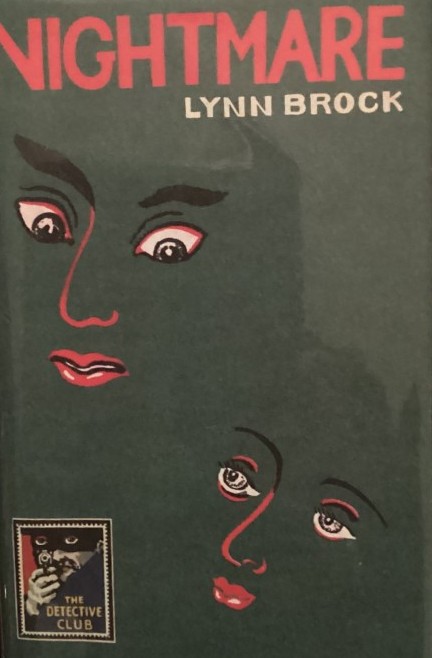Inspiring Older Readers
 posted on 10 Apr 2023
posted on 10 Apr 2023
Nightmare by Lynn Brock
Lynn Brock was the pseudonym of Irish playwright, Alexander Patrick McAllister who achieved considerable success as a ‘Golden Age’ detective novelist when he created the Colonel Gore novels in the 1920s. But in 1932 he published Nightmare which signalled a serious departure from the formula he’d established and which turned out to be a commercial disaster. However, later aficionados of that period of crime thrillers have re-evaluated Nightmare and made it one of the more significant novels of that period.
In his alternative guise as a writer for the stage, Brock found himself in sympathy with other authors such as Shaw and Eliot who were influenced by the work of Schopenhauer. The German philosopher’s theory of human motivation driven by blind ‘Will’ presupposed humanity in constant struggle, ‘a war of all against all’, which ensured a life of suffering, misfortune and alternating pain and boredom. Rather daringly, Brock decided to integrate this philosophy in his novel and this probably accounts for why an audience expecting a more recognisable, formulaic detective story found themselves at a loss when it came to this story.
Rob Reef writing in his 2017 introduction to this reissued novel captures the kernal of the plot thus:
“…the story follows the tragic misadventures of Simon Whalley and a handful of other characters trapped in an ominous house community revealing the ‘war of all against all’ and individual suffering in a nutshell.”
Writer Whalley and his wife eke out a sort of living from his novels and take a flat in a house which is sandwiched between the pleasant but buttoned-up and Conservative Mr Knayle in the flat below and the repulsive Prossip family above. Whalley and his wife fall out with the Prossips over the Whalley’s dog and, aided by a slatternly maid, they set about a systematic harassment of the Whalleys.
Elsa Whalley has charmed Mr Knayle who fancies himself in love with her but when she and her husband are forced to temporarily leave their flat to get away from the harassment, the dog Elsa dotes on is killed and, just to compound the growing sense of gloomy tragedy, she dies of an infection she gets from a thorn in the hand that turns septic. These tragedies are enough to unhinge Whalley and all of the inhabitants of the house find themselves being drawn down into a terrible maelstrom of disasters.
Whalley’s response to the death of his wife is to plan the systematic murder of the Prossips, who he sees as the architects of all his misery. The last third of the book is almost like a cut-price Shakespearean tragedy as the story moves to its seemingly unavoidable conclusion and the stage is filled with corpses.
Rob Reef is astute in his introductory remarks when he notes:
“What makes Nightmare truly genuine is its subtext. The plot not only unveils the motives of the crimes committed, it leads one to the metaphysical core of the human condition itself. Throughout the book the characters develop an uncanny consciousness of their nightmare-like existence in an endlessly striving and meaningless universe.”
Certainly true. But…. It has to be said that by the end the reader too (well this reader most certainly) becomes all too aware that he’s staring into a meaningless void stripped of morality and purpose. And this is not a comfortable or relaxing place to be – so much so that it makes the last 50 pages a real trial to stick with. I did in the end but it felt like I needed to get out into the light as quickly as possible once I’d put the book down.
The book has been reissued as a Detective Story Club Classic by Collins and is an affordable hardback at just £9.99.
Terry Potter
April 2023